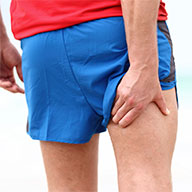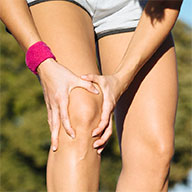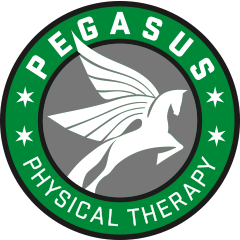Patient Resources
Common Injuries
Insurance
At Pegasus Physical Therapy, we strive for transparent communication regarding insurance benefits and coverage. As a courtesy, we will verify coverage with your insurance carrier. This is not a guarantee of benefits, and we recommend you call your insurance carrier to verify benefits.
We accept most major insurance plans. We are in-network with the following insurance plans:
- Blue Cross Blue Shield PPO
- UnitedHealthcare
- Medicare
- OptumHealth
- Humana
- Multiplan
- PHCS
Pegasus Physical Therapy accepts all out-of-network benefits.
We accept Workers Compensation cases. Our physical therapists will communicate with your referring physician and case manager to promote a safe and timely return to work.
In addition, we offer competitive self-pay rates.
At Pegasus Physical Therapy, we work hard to ensure all patients reach their full potential. Unfortunately, insurance constraints may limit your ability to complete the prescribed physical therapy program. We want to ensure that our patients are able to achieve their goals while limiting their out-of-pocket expenses—thus, we carefully choose the insurance networks we work with.
Seeking out-of-network treatments at Pegasus Physical Therapy may be to your advantage, as some insurance providers may limit in-network physical therapy coverage to 6-8 visits, but do not have those restrictions on out-of-network care. These visit restrictions may prove burdensome for a post-surgical patient who will likely require additional treatments to regain function.
New Patient Registration Forms
Already scheduled your initial evaluation? Make every minute count at your appointment by completing our intake forms before you arrive. Download forms here.
Things to Bring for Your First Visit
- Valid driver’s license
- Physician referral
- Insurance card
- Clothing and shoes appropriate for your condition
Pay Your Bill Online
Select this link to pay your bill online.
Common Injuries
Physical therapy can play a significant role in treating the following common injuries:
IT Band Syndrome
 The Iliotibial (IT) band is connective tissue that runs from the pelvis, over the hip and inserts into Gerdy's tubercle. The IT band stabilizes the knee during activity; runners sometimes experience pain caused by friction and inflammation, otherwise known as IT band syndrome.
The Iliotibial (IT) band is connective tissue that runs from the pelvis, over the hip and inserts into Gerdy's tubercle. The IT band stabilizes the knee during activity; runners sometimes experience pain caused by friction and inflammation, otherwise known as IT band syndrome.
A common misperception is that “rolling out” the IT band with a foam roller will solve the problem. While this may bring temporary relief, it does not address the underlying etiology. Many times, knee pain can be caused by hip abductor weakness, specifically the gluteus medius.
At Pegasus Physical Therapy, we work with patients to correct both strength deficits as well as muscle activation pattern — through Neuromuscular Re-education —to promote a safe return to sport. A thorough running evaluation may be helpful to minimize future risk of injury.
Pegasus Physical Therapy offers complimentary injury screenings.
Rotator Cuff Impingement
The rotator cuff is a collection of four muscles that contribute to glenohumeral joint (shoulder) movement and stability. Patients with rotator cuff impingement may experience pain when reaching overhead, into the back seat of their car, or performing quick arm movements.
 A major cause of impingement syndrome is improper positioning and biomechanics of the shoulder complex. Contributing factors include excessive anterior tilt and limited upward rotation of the scapula. Such limitations may be related to tight musculature (pectoralis minor) and/or weakness (lower trapezius).
A major cause of impingement syndrome is improper positioning and biomechanics of the shoulder complex. Contributing factors include excessive anterior tilt and limited upward rotation of the scapula. Such limitations may be related to tight musculature (pectoralis minor) and/or weakness (lower trapezius).
With personalized consultation and treatment, we carefully examine the underlying cause of pain, and incorporate successful techniques such as Dynamic Rhythmic Stabilization and Neuromuscular Re-education to facilitate a timely recovery.
Pegasus Physical Therapy offers complimentary injury screenings.
Lower Back Pain
 Nearly every adult in the U.S. experiences lower back pain at some point in their lives. Lower back pain can be caused by a variety of factors including muscular imbalances, improper sitting or lifting, or a herniated disc—which may put pressure on nerve roots. This may manifest itself as numbness and tingling into the legs and toes.
Nearly every adult in the U.S. experiences lower back pain at some point in their lives. Lower back pain can be caused by a variety of factors including muscular imbalances, improper sitting or lifting, or a herniated disc—which may put pressure on nerve roots. This may manifest itself as numbness and tingling into the legs and toes.
Because of the dynamic nature of the spine, special attention must be taken to assess its overall function, stability and mobility — to correctly identify what is causing the symptoms.
At Pegasus Physical Therapy, we review our patient’s functional movement patterns, segmental mobility of the spine, and ergonomics to target the underlying source of pain. With advanced knowledge in orthopaedics, your physical therapist will develop a comprehensive treatment strategy that may include manual mobilizations, functional movement training and core stabilization exercises.
Pegasus Physical Therapy offers complimentary injury screenings.
Muscle Strain
A strain refers to damage of the muscles and fibers that attach muscles to bone. Hamstring injuries are among the most common sports injuries and can result in chronic pain. Over the course of a competitive season, re-injury rates for hamstring strains have been documented to be as high as 31%.
 Current research suggests that a rehabilitation program incorporating agility and trunk stabilization exercises is superior to a program that isolates hamstring stretching and strengthening.
Current research suggests that a rehabilitation program incorporating agility and trunk stabilization exercises is superior to a program that isolates hamstring stretching and strengthening.
Our highly trained physical therapists will guide you through the rehabilitation process. We will carefully examine any biomechanical faults that may have contributed to your injury, and implement evidence-based treatments to promote a timely return to sport.
Pegasus Physical Therapy offers complimentary injury screenings.
Patellofemoral Pain Syndrome (PFPS)
 Running injuries can be caused by a wide variety of factors. Inadequate training, rapid increase in mileage, improper footwear and poor running gait can sideline even the most seasoned runner. A common injury experienced by runners is patellofemoral pain syndrome (PFPS)--irritation of the cartilage underneath the patella, and may be caused by poor tracking of the patella within the trochlear surface of the femur. Typically, pain worsens with prolonged sitting and during stair negotiation.
Running injuries can be caused by a wide variety of factors. Inadequate training, rapid increase in mileage, improper footwear and poor running gait can sideline even the most seasoned runner. A common injury experienced by runners is patellofemoral pain syndrome (PFPS)--irritation of the cartilage underneath the patella, and may be caused by poor tracking of the patella within the trochlear surface of the femur. Typically, pain worsens with prolonged sitting and during stair negotiation.
Pegasus Physical Therapy was designed with the runner’s needs in mind. We use video gait analysis and other biomechanical assessment tools to optimize your running gait. Patients and therapists work together as a team to develop custom Return to Running programs—to get athletes back to running following injury.
Pegasus Physical Therapy offers complimentary injury screenings.
The resources above are intended for informational purposes only. This information should not be considered complete or exhaustive and is not intended as a medical diagnosis. Do not diagnose or self-treat your condition. You must contact your physician for a comprehensive medical exam.
